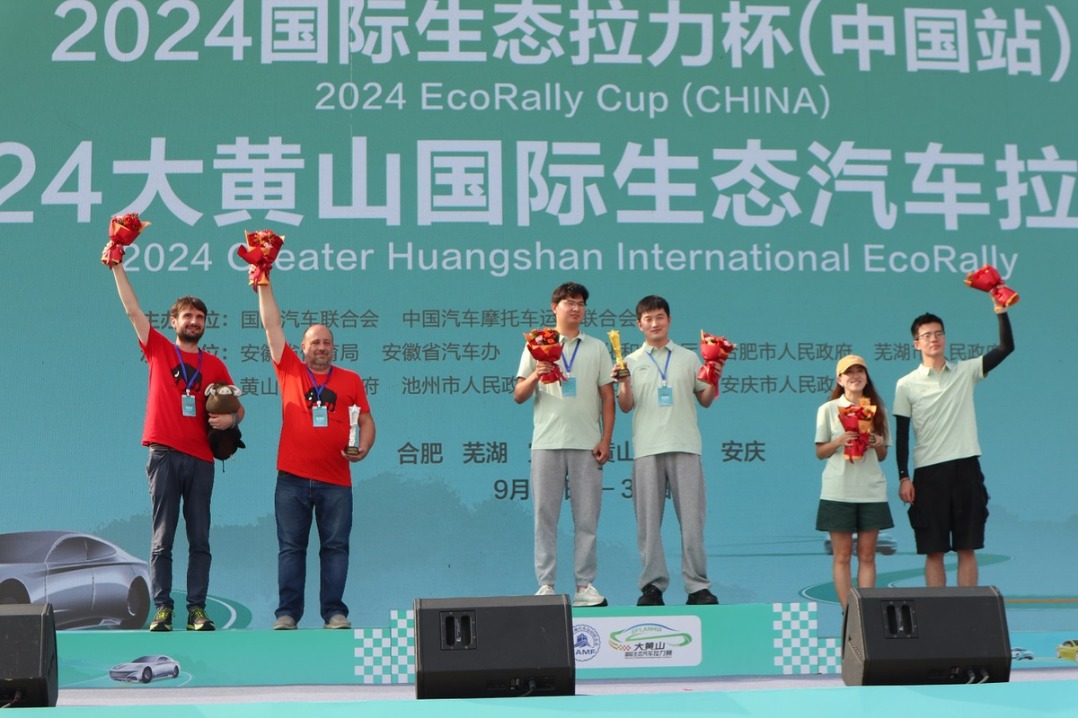CPC education campaign draws wide attention


Political parties from around the globe inspired by major study program
An intensified education campaign by the Communist Party of China to study and implement Xi Jinping Thought on Socialism with Chinese Characteristics for a New Era has attracted the attention of political parties worldwide.
They have been inspired by the study program, which strengthens the Party's capacity to tackle risks and challenges in governing the nation.
Leaders of world political parties visited cities in Hubei province earlier this month to witness the province's achievements in practicing the Thought.
They were assured that the ongoing thematic education campaign would help the Party reinforce unity and improve its governance capacity to make further progress toward its goal of national rejuvenation through the Chinese path toward modernization.
Ali Mashal, assistant minister of the Arab-China Relations Commission of the Fatah Party of Palestine, said that over the years, the CPC has taken substantial steps to build itself into a powerful political party, and China's achievements in economic, social, technological and cultural sectors, and in Party building, are inseparable from the CPC's strong leadership.
Xi Jinping Thought on Socialism with Chinese Characteristics for a New Era is crucial in guiding China to secure victory in eliminating absolute poverty and addressing inadequate and unbalanced development nationwide, Mashal said.
He added that the education campaign to study and implement the Thought throughout the Party will help the CPC achieve unity in thought, will and action, and ultimately ensure that it strengthens its solidarity and better leads the Chinese people in making new achievements on a new journey.
Mashal was among more than 170 figures from 36 political parties in some 30 countries invited by the International Department of the CPC Central Committee to visit Hubei.
During the tour, they witnessed the province's achievements in implementing Xi Jinping Thought on Socialism with Chinese Characteristics for a New Era. Representatives from international media and think tanks joined the group tour.
In April, the CPC launched the education campaign to study and implement the Thought among its 96 million members. As part of the campaign, the Party initiated a research and fact-finding drive with the aim of solving new problems and serving scientific decision-making.
Complex situations
Explaining the importance of the campaign and how it should be carried out, President Xi Jinping, who is also general secretary of the CPC Central Committee, said the Party faced complex situations at home and abroad on the new journey in the new era, with challenging tasks related to domestic reform, development and stability, as well as uncertain and unpredictable risks and challenges.
Presiding over a group study session of the Political Bureau of the CPC Central Committee on March 31, Xi said the goal of studying the Thought lies in its application. Efforts should be made to use the Thought to achieve new progress and breakthroughs in Chinese modernization, solve conflicts and problems facing socioeconomic development, prevent and defuse major risks, and advance the Party's full and rigorous self-governance, he said.
Mashal said that learning from the CPC's governance experience is important and helpful to political parties around the world, given the huge achievements China has made in sustained socioeconomic growth and its rising international influence.
The Thought, which was established as the guiding ideology of the entire Party at the 19th CPC National Congress in 2017, has become the new compass for the CPC in governing the nation.
It covers various areas, including reform, development, social stability, domestic affairs, foreign relations, national defense, and governance of the Party, the State and the military, all of which constitute a comprehensive and scientific system for the CPC's new theories.
The Thought is widely viewed as a fundamental guideline in China's governance philosophy, and reflects the way in which the CPC seeks to modernize its governance system and actively take part in global governance.
Initiating a campaign centered around the Party's new theories is considered to be of paramount importance and urgency for the CPC, as it comes at a crucial time for advancing national rejuvenation through the Chinese path to modernization amid new challenges arising from domestic and international situations.
Vu Trong Lam, deputy chief editor of the Vietnamese Communist Review magazine, said the CPC's experience and practices in studying and implementing the Thought and the guiding principles of the 20th CPC National Congress are of great value for the Communist Party of Vietnam.
He said Vietnam is also striving to promote the construction of a socialist society and build a prosperous, democratic, culturally advanced and harmonious socialist country in which the people are the masters.
"We highly appreciate the CPC's scientific and orderly practices in studying and implementing Xi Jinping Thought on Socialism with Chinese Characteristics for a New Era, and firmly believe that the Chinese people will successfully accomplish the goals set out in the 20th CPC National Congress, achieve the second centenary goal, and (that China will) become a modern socialist country in all respects by the middle of the 21st century," he added.
Xi has said on various occasions that Chinese Communists relied on continuous learning to get where they are today, and this will inevitably continue to be the case in the future.
Generations of leaders have paid great attention to intra-party education to make the CPC a political party committed to learning in order to equip its members and officials with strong political beliefs, theoretical mindsets and the latest know-how essential to ruling the country over the long term and better serve the people.
Based on such a tradition, the CPC has made it a regular practice and an institutionalized requirement for all its members to gain a good command of the Party Constitution, regulations and related major policies, meet Party standards, and build it into a Marxist learning party.
Joint efforts
Ruvislei Gonzalez, head of the Asia and Oceania team and member of the Scientific Council at the Research Center of International Policy, Cuba, said the CPC's education campaign will help establish collective efforts among all its members and allow them to better understand the changing times and the transformation of the domestic and international situations.
Gonzalez said China has contributed to the development of socialism in recent years based on practical experience and theoretical innovation. Through collective learning and continuous improvement, the enormous progress China is making will provide a valuable reference for other socialist countries, he added.
For CPC members and the Chinese people, studying the Thought can better equip them with the Party's logic of governance, and enable them to learn more about where China stands today and the path it will take in the future, Gonzalez said.
The CPC's history speaks volumes for the reasons behind the Party's growth and strength. It has always provided strong theoretical training for its members and officials, so they can remain firm in their joint faith with a strong will and coordinated actions.
Observers said the fine tradition of intra-Party learning and education has helped the CPC think big and continue improving its ability to govern the world's most populous nation. Systematic and regular intraparty education has also helped the largest ruling political party in the world cope with complex and grave challenges since it was founded more than a century ago.
Established in July 1921, the CPC has grown from a political party with just a few dozen members to an entity that governs a country of 1.4 billion people. Standing the test of time, it has led the nation in making steady progress toward prosperity and in becoming the world's second-largest economy.
While uniting the Chinese people to achieve long-term economic growth and social stability, the CPC has also led the country to become an important international player and actively take part in global governance in an open, inclusive and cooperative manner.
Francois Janvier Yahouedeou, member of the Politburo and spokesman for the Republican Bloc of Benin, said that continuously strengthening intra-party education is not only necessary for maintaining ideological unity within the Party. It is also the best way to ensure that its members never forget their original aspirations and keep the Party's founding mission firmly in mind. He added that he believes this is the essence of the CPC's efforts to carry out the education campaign to study the Thought.
"We were aware during the visit to Hubei that the thematic education campaign helps guide the people to secure progress in socioeconomic growth, youth employment and environmental protection, among other fields," Yahouedeou said.
Marie Pencikova, vice-chairwoman of the Communist Party of Bohemia and Moravia, in the Czech Republic, said the CPC's intra-Party education ensures the unity of the Party's ideology and the implementation of its decisions and policies.
She said she was impressed that the CPC gives importance to young people in learning the ideology of socialism with Chinese characteristics. Allowing them to grow up in a positive and upward theoretical environment and nurturing correct ideological concepts are important to ensure that China consistently pursues the socialist path, she added.
Putting people first and upholding people-centered development are fundamental to the Thought. Since becoming general secretary of the CPC Central Committee in 2012, Xi has been devoted to the people's interests, paid great attention to their well-being, and had a sincere sentimental attachment to their happiness and hardships. Upholding people-centered development is not only a theoretical advocate for serving the people wholeheartedly, but matters to the value of the Party's governance philosophy.
Ganesh Shah, secretary of the Central Committee of the Communist Party of Nepal (Maoist Centre), said he was impressed by the CPC's adherence to putting the people at the center of its development philosophy, emphasizing the concept of common prosperity for all people, and promoting harmonious social development.
China has made great achievements in promoting economic development, and has become the world's second-largest economy, he said, adding that as a developing country, Nepal wants to learn from China about how to eliminate poverty and strengthen mutual cooperation.
caodesheng@chinadaily.com.cn
- Leaders of countries send congratulations on PRC's 75th founding anniversary
- Chinese naval ships open to public tours during National Day holiday
- Top leaders of Russia, DPRK, Vietnam, Laos, Cuba send congratulations on PRC's 75th founding anniversary
- Beijing Railway Station celebrates National Day
- Elliot's exploration of Confucius cultural festival
- International NEV rally concluded in Anhui





































